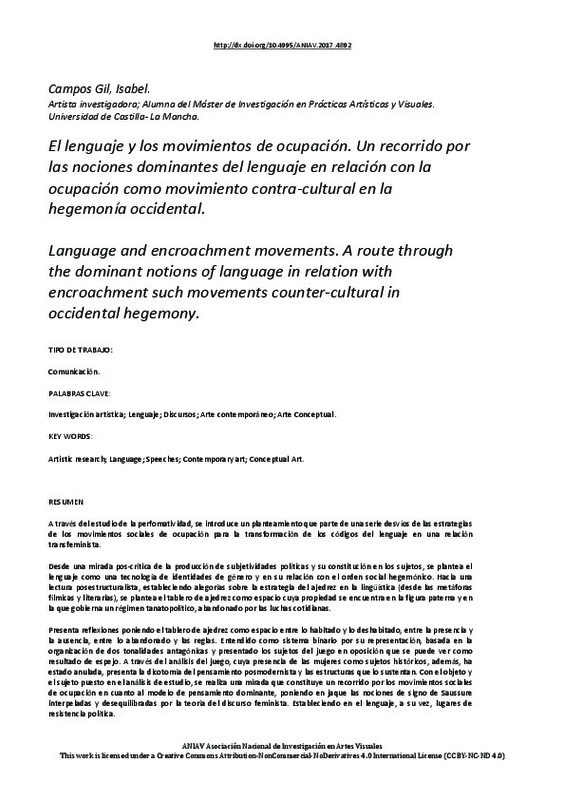JavaScript is disabled for your browser. Some features of this site may not work without it.
Buscar en RiuNet
Listar
Mi cuenta
Estadísticas
Ayuda RiuNet
Admin. UPV
El lenguaje y los movimientos de ocupación. Un recorrido por las nociones dominantes del lenguaje en relación con la ocupación como movimiento contra-cultural en la hegemonía occidental
Mostrar el registro completo del ítem
Campos Gil, I. (2017). El lenguaje y los movimientos de ocupación. Un recorrido por las nociones dominantes del lenguaje en relación con la ocupación como movimiento contra-cultural en la hegemonía occidental. En Glocal [codificar, mediar, transformar, vivir] III Congreso Internacional de Investigación en Artes Visuales. Editorial Universitat Politècnica de València. 180-186. https://doi.org/10.4995/ANIAV.2017.4892
Por favor, use este identificador para citar o enlazar este ítem: http://hdl.handle.net/10251/106665
Ficheros en el ítem
Metadatos del ítem
| Título: | El lenguaje y los movimientos de ocupación. Un recorrido por las nociones dominantes del lenguaje en relación con la ocupación como movimiento contra-cultural en la hegemonía occidental | |
| Otro titulo: |
|
|
| Autor: | Campos Gil, Isabel | |
| Fecha difusión: |
|
|
| Resumen: |
[EN] Through the study of performativity, an approach is introduced that starts from a series of desviations from the strategies of the social movements of occupation for the transformation of the codes of language into a ...[+]
[ES] A través del estudio de la perfomatividad, se introduce un planteamiento que parte de una serie desvíos de las estrategias de los movimientos sociales de ocupación para la transformación de los códigos del lenguaje ...[+]
|
|
| Palabras clave: |
|
|
| Derechos de uso: | Reconocimiento - No comercial - Sin obra derivada (by-nc-nd) | |
| ISBN: |
|
|
| Fuente: |
|
|
| DOI: |
|
|
| Editorial: |
|
|
| Versión del editor: | http://ocs.editorial.upv.es/index.php/ANIAV/ANIAV2017/paper/view/4892 | |
| Título del congreso: |
|
|
| Lugar del congreso: |
|
|
| Fecha congreso: |
|
|
| Tipo: |
|








